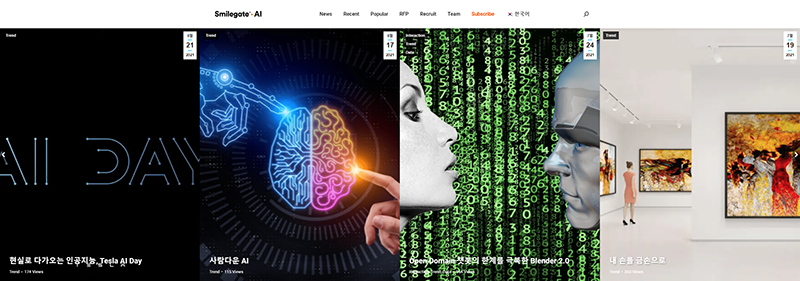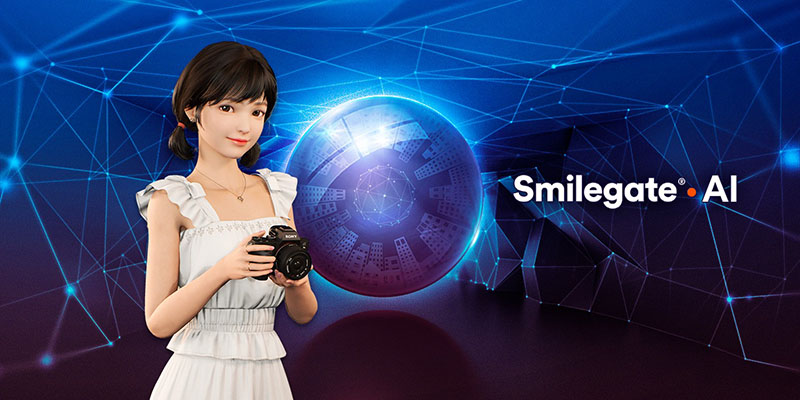The AI speaker plays music that suits my mood that day. Self-driving cars move themselves to their destinations while we watch AI idols rap and dance. All of this was hard to imagine only 20 years ago. Artificial intelligence (AI) has permeated our lives faster and closer than we thought.
Humanoids and cyborgs with human faces and advanced artificial intelligence that think like humans do not remain in imagination anymore. There is also the fear that a dystopian future may come when artificial intelligence, which we have only seen in sci-fi movies, dominates people. At what level is AI technology that resembles or replaces humans?
| Is AI that resembles humans necessary for humans?
Eunji Kwon, Manager of Smilegate.AI (https://smilegate.ai/) Center, Smilegate Group's AI technology organization, plans AI service in the service development team. Her role is to discover AI-based services and implementing them into an actual business. She also reads the market and technology trends based on research. We asked Manager Eunji Kwon for the current status of 'human-like AI'.
[Interview] Eunji Kwon, Manager of Smilegate.AI Service Development Team

Q. What level of human-like AI is now?
The level of human-like AI is defined differently by industry and academia. In particular, emotional AI fields are limited to some sectors or research fields. There are several different ways of cognition, judgment, and expression. It is difficult for non-AI humans and humans to infer emotions from facial expressions accurately. Some argue that human expressions and feelings are based on instinct, not learning. Humans cry for various reasons when they are happy or sad in their daily life, and sometimes they smile with their mouths but not their eyes. There is a limit to accurately analyzing a person's changing facial expression every moment, and more advanced technology is required.
Q. Can AI be implemented to the extent that it threatens humans?
In general, the form that consumers think appears in sci-fi movies or cartoons. AI appearing in the media is smart and can be a threat to humanity. However, in reality, AI is still in the learning stage. Depending on how you use it, it can be a beneficial tool. It can also be developed as an intelligent platform that judges with various personalities and public factors that care for the socially underprivileged.

Q. Is it possible to implement real human emotions with artificial intelligence?
Artificial intelligence that resembles humans must recognize (input) and respond (output) like humans. First, it recognizes human expressions, intonations, voices, gazes, and other physical reactions through cameras and various sensor technologies. However, there are several different cases in the process of cognition and judgment. It is difficult for non-AI humans to infer human emotions just from facial expressions accurately. Accurately analyzing a person's changing facial expressions is limited at the current stage and requires advanced technology.
Big data and deep learning are mainly used to express human-like expressions. For example, when you hear the word 'hello', you prepare data related to the answer and give an appropriate response for each situation. However, there are cases where it is impossible to filter out false data due to the load. When such an issue occurs, we secure quality data, build an advanced dialogue model, and run tests in the actual service field.
Q. Why do you want to implement human-like AI?
Q. Why do you want to implement human-like AI?
The field of service dealing with AI is gradually expanding from a simple industrial form to an area that can naturally communicate and interact with people. AI reflecting human characteristics is expected to have great potential in terms of service application range. In recent years, Affective Computing and Artificial Emotional Intelligence (AEI), which understand and respond to users' emotions, are mainly used in three industries: automobiles, intellectual emotional robots, and health care.
|Game industry, the 'Land of Opportunity in AI research
Smilegate.AI was launched in August of last year as an organization dedicated to Smilegate's AI technology. Based on the assets of Smilegate Group specializes in the entertainment field, it aims for fun AI and human-like AI. How is it different from existing AI research?

Q. How is Human-Like AI and Fun AI different from existing AI?
Unlike existing AI designed for speech recognition, image recognition, machine translation, natural language search, etc., it aims to be an 'attractive and humanly AI' that communicates like a friend. Unlike simple infusion-type interactions, empathy elements that understand and express users' emotions and entertainment elements that give laughter and joy in everyday life are added.
Current AI is not perfect, and it is only now learning data little by little, day by day. Like a child, AI learns from its family, teachers, and friends and forms its self. If AI makes a mistake, it gets scolded and reflects the matter. We focus on artificial intelligence research, such as a pleasant friend full of humanity and joy rather than a universal humanoid.
Q. What projects are currently underway at the center?
Currently, we are working on 5-6 projects, and among them, I take care of two products using visual and voice. I'm working on a TTS (Text to Speech) service related to AI services using cameras and sensors and synthesis technology. The Beta version of the TTS service is scheduled to open internally in the second half of this year.

Q. What are the strengths of Smilegate.AI as an AI research center?
Content is essential in AI-based services. There must be an entertainment element for users to experience fun and enjoyable AI rather than rigid AI. Smilegate, as a game company, has infinite contents that can be utilized in its services. In terms of content utilization, it is a land of opportunity.
| Always new and rapidly changing AI market
AI industry is one of the most popular markets now, and various human resources are gathering. People from different fields come together to develop technologies and build services, from app, web, and AI platform developers to data scientists, designers, and psychologists. What is so unique about AI that attracts so many people?
Q. What are the most significant features of AI practitioners?
Artificial intelligence requires more understanding of user scenarios and prior art than the process of a typical IT project. Therefore, to do AI-related work, it is fundamentally necessary to be open to IT trends. The thesis, news, and conference information are freely shared within the centre, and research is conducted according to technological trends. To reinforce branding, we regularly listen and review special lectures on the overall IT industry.

Q. What project would you like to challenge through the Smilegate.AI Center?
The motto of ‘Whatever you do, make it helpful’ is my driving force behind service planning in the AI field. If you look at the AI or IT services released on the market, many services look good or have good ideas. However, services that actually help or have continuity are rare. I want to plan a service that can be used continuously and give practical help to users and businesses.
|
#Smilegate #Smilegate_AI #Fun AI #Human-Like AI #Enterntainment AI






 TOP
TOP
